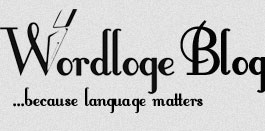 No, this blog post is neither about idioms nor is it a pun on the Wheel of Fortune, it is about loanwords. English has a reputation for being one of the languages that contains the most words. Whether the English language is the language in the wold that has the highest amount of words is a question in dispute. What makes it so difficult is that not all scholars agree upon what exactly counts as an English word. This may sound as a simple issue but I assure it is quite the opposite.
No, this blog post is neither about idioms nor is it a pun on the Wheel of Fortune, it is about loanwords. English has a reputation for being one of the languages that contains the most words. Whether the English language is the language in the wold that has the highest amount of words is a question in dispute. What makes it so difficult is that not all scholars agree upon what exactly counts as an English word. This may sound as a simple issue but I assure it is quite the opposite.
What is English?
As a Germanic language English has roots in both the German and Dutch languages. However, since the Norman Conquest in 1066 not only did the architecture in the English countryside change, many French words also found their way into the English lexicon. They are what we call loanwords. The Norman Conquest is not an isolated historical event that has affected the use of words in English. So do loanwords count as English words? And do inflections count for one or two words? The list goes on.
In any case, the English language still boasts a very high quantity of words. To me loanwords are an integral part of any language. All languages have at one point or another borrowed words from other languages, and some have over time become such an integrated part of the language that native speakers might not even be aware that it is a loanword. With English gaining ground as an international language, e. g. in business, many English words creep into other languages. Language sticklers may condemn these and see them as damaging to their native tongue, but the fact is that any language already contains a certain number of loanwords and foreign words that they now consider a fundamental part of their own lexicon.
The why
There are several explanations to how words find their way into another language. Throughout history people have travelled either for pleasure, for studies, for trade, or because borders were moved and countries changed nationality which meant that people would settle in a new area that had previously belonged to a different country. It was thus inevitable that people would use words heard to describe new vegetable or fruit that merchants would bring from their country, or use terms heard from their new neighbour. So Vikings, for example, didn’t only leave fear, terror and devastation behind, but also, yes, words! Have a look at the following words just to name a few: anger, bag, birth, bug, cake, club, egg, geyser, gift, guest, husband, knife, mistake, outlaw, race, run, seat, trust and window. I wouldn’t think geyser was much of a surprise, but I am pretty sure many of the others were.
New words would also be used when an idea, notion, movement or particular research came from another country. Many publications would to begin with only appear in a few languages and sometimes there quite simply was no equivalent in the target language that would describe a term carrying the same meaning as the foreign word. German, for instance, is often used for academic writing and literature. A good example of this, are the German words Schadenfreude and Gemütlichkeit. A literal translation of Schadenfreude would be ‘harmjoy’ (Schaden = harm, damage, Freude = joy), and it denotes a feeling of pleasure or satisfaction through somebody’s misfortune. This concept doesn’t exist in the English speaking culture and therefore not in the language. The German word has been adopted in its original form. The same goes for Gemütlichkeit. It means that a situation is very nice, friendly and cosy. Both loanwords exist in the English language on equal terms with other English words, and although these might be obvious loanwords others are not.
Lexical heritage
In specific fields certain languages dominate. Just take one look at a medical book and you will find it full of words of Latin or Greek origin. And while it may come as no surprise that the French have provided us with a number of cooking terms, many other foreign languages have had a great influence on the vocabulary we use today as you will see in the, by no means complete, list below.
From Arabic
Alcohol, apricot, artichoke, assassin, aubergine, average, candy, caravan, cheque, cotton, cork, giraffe, hummus, jasmine, garbage, hazard, lemon, orange, safari, tuna
From French
Beef, café, caramel, carrot, chestnut, cream, croissant, cuisine, custard, haut couture, judge, justice, lingerie, marmelade, pork, pret-à-porter, retail, sauté, spinach, veal
From German
Delicatessen, doppelgaenger, hamburger, kaput, lager, leitfaden, muesli, noodle, poltergeist, poodle, schnapps, ueber, zeitgeist
From Greek
Air, aerobics, antique, architect, athlete, bacterium, biography, butter, church, economy, encyclopaedia, dialogue, geography, grammar, idol, microscope, problem, symbol, telephone, theatre
From Hindi
Avatar, bangle, bungalow, chutney, jodhpurs, jungle, khaki, karma, mantra, nirvana, pashmina, punch, pyjamas, shampoo, sorbet, yoga
From Italian
Biscuit, bravo, broccoli, cameo, cartoon, cello, diva, duet, duo, fiasco, finale, grotesque, lasagne, madonna, motto, opera, piano, soprano, studio, sultana, villa
From Spanish
Anchovy, avocado, banana, barbecue, breeze, cafeteria, California, canoe, cigar, cocoa, guerrilla, hurricane, jade, key, macho, mosquito, oregano, patio, potato, savvy, tobacco, vanilla
Now, you may think that all these loanwords have existed in the English lexicon for a long time and the process of exchanging vocabulary across borders is something that belongs in the past. But, this is far from an extinct phenomenon. You will still find examples of this in minority communities. In a region where two or more languages co-exist it is inevitable that they borrow from each other. Just think of Quebec in Canada, Belgium where the Flemish speak Dutch and the Walloons speak a dialect of French, and Schleswig Holstein in Denmark and Germany. Sometimes calques (a direct translation) are created. Or as mentioned before, if a notion or idea is developed in one country, chances are that the original term will be reused. With the rise of computer technology and the Internet IT terminology is often kept in its original English form, e.g. words such as server, email, software, etc.
Sometimes countries will try to fight this and come up with new expressions. A good example of this is France’s battle against the widely used Anglicism email or even mail. The official term is courrier/courriel électronique but in everyday French this term is losing its functional high ground to its English forerunner because the word was already in use before the Ministry of Education decided to create a French counterpart in 2003.
Interestingly, loanwords will always be adapted to the existing grammatical structure of a given language. For verbs this could mean that it will be conjugated in the same way as all other verbs which is, I think, a creative way of integrating new vocabulary. Personally, I welcome changes and creative use of new vocabulary. It is exactly what makes language so fascinating.
Kira Petersen
Photo by Moritz Schmidt
